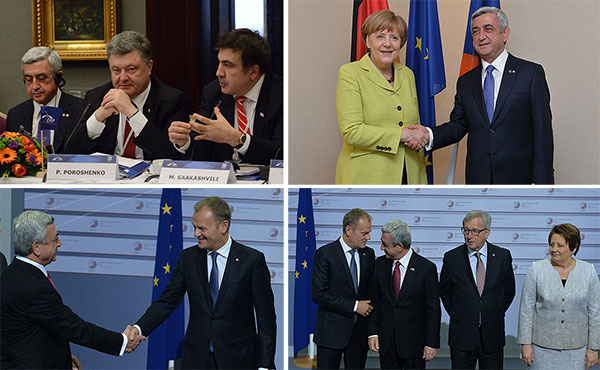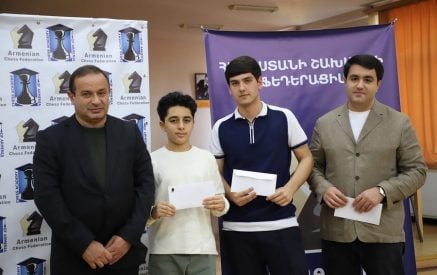In the Eastern Partnership Summit, Armenia’s advantage over isolated Azerbaijan is stressed
On May 21-22, Riga hosted the Eastern Partnership Summit, which was attended by German Chancellor Angela Merkel, British Prime Minister David Cameron, French President Francois Hollande and all the leaders of all the European prestigious structures.
One of the clauses of the Final Declaration of the Summit was the reaffirmation of the EU stance on the illegal annexation of Crimea and Sevastopol. In this regard, the delegation of Armenia and Belarus expressed their objections in support of Russian Federation. Later, it turned out that this term remains in the document, as it refers not to the Eastern Partnership countries but the EU member countries and since Armenia is not an EU member, then it can have no effect and no relation to this term. “The consultations in Riga are proceeding in a harmonious fashion, and we will be able to coordinate the joint communique, which will stress, above all, that the territorial integrity of each country must be protected. This was a common stand shared by the Eastern Partnership countries,” Merkel explained.
There was a special clause in the final document about the Karabakh conflict settlement, which mentioned that the issue should be regulated on the basis of the principles and norms of international law. Moreover, no principle of the international law was identified, neither the territorial integrity nor the right to self-determination. The EU just recorded that it supports the efforts by the OSCE Minsk Group on the Nagorno-Karabakh conflict. This raised discontent with Azerbaijan, and it turned out that they have objections to the wording in the final document. Later, the disagreements were managed to settle, while the text regarding the Nagorno-Karabakh conflict remained the same, which is a positive achievement for the Armenian diplomacy.
Read also
Armenia is ready to intensify relations with the EU
At the meeting of EPP Eastern Partnership leaders, Serzh Sargsyan delivered a speech in which he stressed that Armenia’s European agenda remains a foreign policy priority of ours, and we are committed to deepening and further consolidating our cooperation with the EU. “We are of the view that any given Partner’s membership to any structure does not limit its cooperation with other structures. It is for that reason that Armenia, while acceding to the Eurasian Economic Union, continues to be committed to deepening and expanding relations with the EU,” he noted and added that with its balanced policy Armenia have avoided setting a new hotbed of tension in the current complicated circumstances of the European geopolitics; moreover, it has managed to build its policy on the premises of compatibility, equilibrium and multi-vectored cooperation with different integration systems. “These very principles will serve as a basis for the envisaged legal document to govern relations between Armenia and EU, for the conclusion of which we count on your support.”
Turning to the issue of Nagorno-Karabakh, S. Sargsyan noted, “Azerbaijan has not ceased resorting to its usual practice of provocations, threats, and anti-Armenian propaganda, thus protracting the conflict settlement process. The anti-Armenian campaign in Azerbaijan is coupled with egregious human rights violations, and it has been a while that the opponents to the regime are labeled as Armenian spying agents. The irresponsible steps of Azerbaijan, which threaten the security of the region we share, shall not go unnoticed by our European partners. Those steps deserve adequate assessment. Hence, I urge not to drift with the current generated by Azerbaijan in various international platforms, and by that avoid sharing responsibility with the latter for increasing tension in our region.”
While in his speech delivered during the Eastern Partnership Summit, S. Sargsyan stressed that Armenia is committed to taking steps jointly with its EU partners to design new legal foundations for our relations, which will reflect, on one hand, the content of the preceding negotiations Armenia conducted with the EU and, on the other, will be compatible with the other integration processes, in particular, with the commitments stemming from our accession to the Eurasian Economic Union. The next remarkable observation by S. Sargsyan was perhaps his hint addressed to Azerbaijan, “Armenia, meanwhile, highly values application of differentiated and tailor-made approaches to every individual country, which shall be designed around the progress made in the implementation of reforms, and reiteration of the principle “more for more.” We strongly believe that all partners shall adhere to shared values and ensure peace and stability of the region. The Republic of Armenia will continue working exactly in this direction.”
Note that prior to the launch of the Summit, information was received that the European Commission has approved the proposal addressed to the EU Council to allow commencing negotiations between Armenia and EU on the Framework Agreement. Before the start of Summit, EU Commissioner for Enlargement and European Neighborhood Policy, Johannes Hahn, in his interview with “Freedom,” noted, “My employees and respective services of the European Commission have submitted a report, which was announced. This was the continuation of “scoping exercise” concluded by Armenian and EU officials, which we completed in late March, and now everything depends on the Council of Europe. I’m very confident that we will get a mandate to start negotiations very soon.”
EU-Russia mutual mild remarks
The “Eastern Partnership” format is not directed against Russia – this is the most common idea voiced by the European senior officials in the Riga Summit, which runs like a “red line” with exactly the following wording, the “Eastern Partnership” is not directed against anyone, and not against Russia. I will repeat that it was and is not about “either/or”, on the one hand, about the annexation with the EU, and on the other hand, about Russia’s desire to have a closer partnership with neighboring countries,” said German Chancellor Angela Merkel, adding that the EU respects the right of each state to be a part of the “Eastern Partnership” program, the right to look for own ways of development, at the same time maintaining the cooperation with the EU. More specifically, Merkel also stressed that they respect Armenia’s decision to look for closer economic cooperation with Russia and the EaEU along with the intense negotiations with the EU. Then, President of the European Council, Donald Tusk, also stressed that the “Eastern Partnership” is not directed against Russia, it is not a “beauty contest” between Russia and the EU.
Generally, still prior to the launching of the Riga Summit, it was already apparent that it is not going to be singled out by its fundamental decisions, by its adopting decisive agreements. German Chancellor Angela Merkel even announced that the easing of visa regimes between Ukraine, Georgia and the European Union is currently impossible. “The easing of the visa regime is possible only upon the completion of all necessary conditions for that. The European Commission has presented a report that Ukraine and Georgia have put much effort into this issue, but not enough effort so as the situation was improved as a whole.”
Prior to the statements by the European diplomats, the official Moscow acted in a slightly lessened stance. Recently, in Brussels, mediated by Germany and France on the Ukraine, the fulfillment of the peace agreement signed in Minsk was included in the agenda of the talks by the NATO Secretary General Jens Stoltenberg and Russia’s Foreign Minister Sergey Lavrov. On these days, information was spread that the Russian side no more contests the trade agreement between the EU and Ukraine, which should be put into action at the beginning of the next year. The matter is about the agreement to establish a Deep and Comprehensive Free Trade Area as a part to the Association Agreement.
In other words, the Brussels sent “messages” to Moscow, saying that it is ready to reconcile with the concerns of the Russian side expecting that Moscow would not apply economic sanctions against Ukraine and would promote to peace efforts in the eastern Ukraine. The Russian Economic Development Minister Alexey Ulyukayev, after negotiating with the EU and Ukraine officials in Brussels, noted that the Russian side no more contests the EU and Ukraine visa-free regime to be effective since January 1, 2016. Foreign Minister of Ukraine Pavlo Klimkin said that one of the key outcomes of the tripartite talks in Brussels was that the free trade regime between the EU and Ukraine will be protracted and will take effect from 1 January 2016.
Aliyev’s boycott
Although initially, there was information that the Azerbaijani President will attend the EU Eastern Partnership Summit, however, Ilham Aliyev did not travel to Riga. The motivation brought by the official Baku was “Aliyev’s extremely tough agenda.” Anyway, the information presented by the APA news agency was more remarkable, which was grounded on “diplomatic sources”. The Azerbaijan government agency presented Aliyev’s true reason not to travel to Riga. He did so to be against the “campaign against Azerbaijan.” “The expansion of the “black PR” campaign against Azerbaijan in close collaboration with some western powers on the eve of the first European Games has triggered a reasonable uproar,” reports the source. “The Azerbaijani government has received information that as on the eve of the 2012 Eurovision song contest, a few days before the first European Games, the European Parliament is going to adopt a new special resolution on Azerbaijan. Taking these factors into account, President Ilham Aliyev has refused to participate in the Riga summit.” In fact, prior to the Riga summit, Aliyev has expressed his protest against the recent criticism by the West over Azerbaijan and has put some conditions before the European diplomats, but being refused, he had nothing else to do but to boycott the Riga Summit.
Thus, with participation in the Riga summit and the visible goodwill attitude by the European diplomats towards Armenia, officials Yerevan compared to Azerbaijan recorded significant diplomatic victories.
Emma GABRIELYAN,
“Aravot”





















































